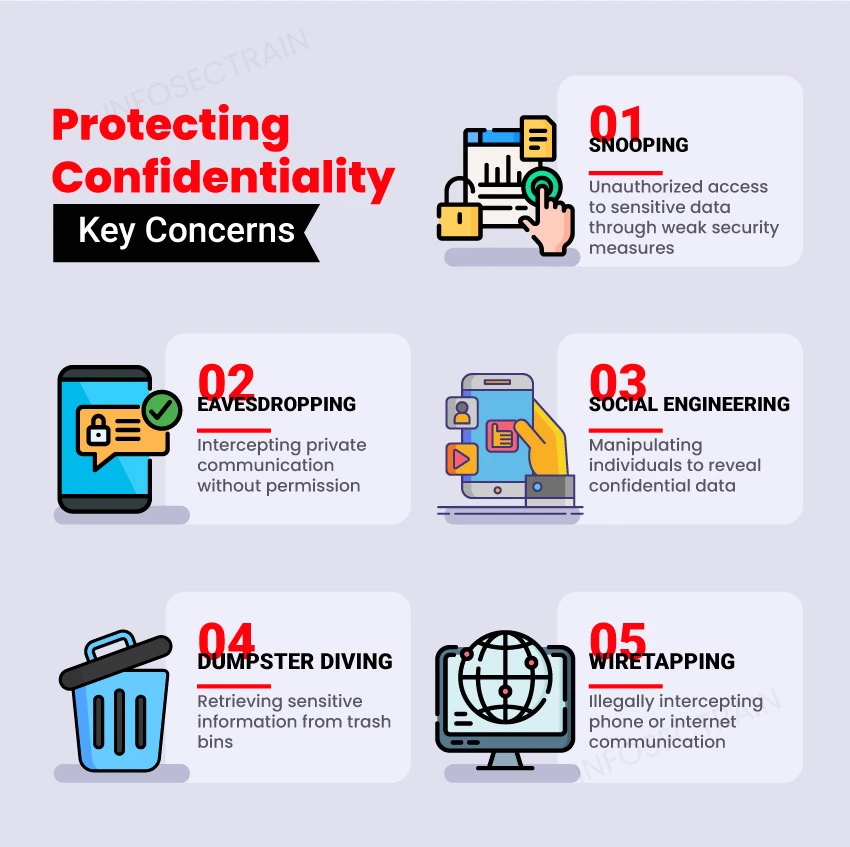Protecting Confidentiality: Key Concerns & Prevention
Today, our lives are completely interconnected with the digital world, making protecting confidential information more crucial than ever. When you click, swipe, or tap on something, it leaves behind a digital footprint, creating a vast repository of personal and sensitive data. However, amid the convenience and connectivity technology provides, there is also a darker side – a realm of cyber threats ready to take advantage of vulnerability in our digital defenses.

The confidentiality risks are diverse, ranging from complex cyberattacks to seemingly harmless security mistakes. This dynamic landscape demands our relentless attention and vigilance, as well as a commitment to continuous learning and adaptation to new threats. In this post, we explore the intricacies of confidentiality concerns in today’s digital landscape.
Confidentiality Concerns and Prevention Measures

1. Snooping: Snooping occurs when personal or enterprise information is accessible to unauthorized individuals due to poor security practices such as weak passwords, unsecured networks, unpatched software, inadequate access controls, or insufficient data encryption. One of the most effective measures to prevent snooping is the implementation of robust access controls. Access controls restrain who can access what information and under what circumstances. Organizations can significantly reduce unauthorized access risk by implementing access controls effectively.
Example: An attacker intercepts unencrypted network traffic to capture login credentials or financial data.
2. Eavesdropping: Eavesdropping occurs when unauthorized individuals listen in on sensitive conversations, either in person or through electronic means, such as intercepted phone calls or hacked communication channels. Establishing clear guidelines for sensitive conversations is essential for preventing eavesdropping. Organizations can implement policies restricting sensitive discussions to designated areas. Further, using encrypted communication channels and ensuring that only authorized individuals have sensitive information access can mitigate eavesdropping risk. Regular training sessions on cybersecurity awareness and best practices can also reinforce the importance of safeguarding sensitive conversations from unauthorized access.
Example: An attacker listens in on a confidential business meeting to gather trade secrets or financial data.
3. Social Engineering: Social engineering attacks leverage psychological manipulation to trick employees into revealing confidential information. Cybercriminals can breach confidentiality and gain unauthorized access to confidential data or systems by impersonating trusted individuals and exploiting human trust and emotions. Employee security awareness training serves as a crucial defense mechanism against such attacks. By increasing awareness of common social engineering tactics and educating employees on identifying and handling suspicious information requests, organizations can effectively empower their workforce to counter this threat.
Example: An attacker impersonates a trusted colleague or IT support technician to trick an employee into revealing login credentials.
4. Dumpster Diving: Dumpster diving is a malicious technique used by attackers to search through discarded materials, such as trash or waste containers, to retrieve valuable or sensitive information. To combat this threat, organizations should prioritize the secure disposal of confidential documents. Shredding documents before disposal makes it extremely difficult for dumpster divers to reconstruct valuable information. Implementing a shredding policy and providing employees with shredders or centralized shredding services can help ensure that sensitive information is properly destroyed before being discarded.
Example: An attacker retrieves confidential client records from improperly disposed-of documents in a company’s trash bin.
5. Wiretapping: Wiretapping, also known as electronic eavesdropping, poses a substantial threat to confidentiality. Cybercriminals exploit this method to intercept communication channels, gaining unauthorized access to sensitive information and putting organizations at risk of data breaches. Encryption plays a crucial role in preventing wiretapping attempts by encoding the transmitted data, making it unintelligible to anyone without the decryption key. Implementing encryption protocols for communication channels, such as email and messaging platforms, can help ensure that the information remains protected from unauthorized access even if intercepted.
Example: An attacker taps into phone lines or communication channels to intercept sensitive emails or phone calls.
In conclusion, safeguarding confidentiality requires a multi-faceted approach that addresses various threats and vulnerabilities. Organizations can significantly reduce the likelihood of confidentiality breaches and protect confidential data from unauthorized access by implementing best practices such as access control, secure document disposal procedures, and employee training on security awareness.
How Can InfosecTrain Help?
InfosecTrain assists in understanding confidentiality concerns by providing comprehensive training courses, like CompTIA Security+ and Certified Ethical Hacker (CEH), focusing on safeguarding sensitive information. Through our courses and workshops, we provide insights into encryption methods, access control measures, and best practices for handling confidential data. Further, we simulate real-world scenarios to illustrate the importance of confidentiality and how to mitigate risks effectively. Our training empowers individuals with the expertise to maintain confidentiality standards and prevent unauthorized access or disclosure of data.
TRAINING CALENDAR of Upcoming Batches For Security+ SY0-701
| Start Date | End Date | Start - End Time | Batch Type | Training Mode | Batch Status | |
|---|---|---|---|---|---|---|
| 16-Aug-2025 | 28-Sep-2025 | 09:00 - 13:00 IST | Weekend | Online | [ Open ] | |
| 13-Sep-2025 | 26-Oct-2025 | 19:00 - 23:00 IST | Weekend | Online | [ Open ] |







 1800-843-7890 (India)
1800-843-7890 (India)